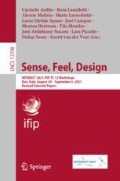Abstract
As modern User Interfaces (UIs) are used in varying context-of-use situations, sophisticated mechanisms to control UI adaptations are needed. UI adaptations describe the process of manipulating the initial UI to fit the current context-of-use. Typically, the UI and context-of-use are formalized by models. If these adaptations are not well-defined or checked properly, undesirable application of multiple adaptations may threaten consistency. To prevent conflicting UI adaptations and ease the specification of UI adaptation rules, we introduce a notion of adaptation consistency based on Triple Graph Grammars (TGGs) augmented with a 0–1 priority system. We choose TGGs because it is a formalism for consistency maintenance in model-driven engineering. We extend the TGG semantics with a 0–1 priority system to assess for consistency regarding application order. Based on this solution idea, we present the implementation of a prototypical TGG interpreter to suggest a design- and run-time solution for ensuring consistency of UI adaptations.
Access this chapter
Tax calculation will be finalised at checkout
Purchases are for personal use only
References
Anjorin, A., Leblebici, E., Kluge, R., Schürr, A., Stevens, P.: A systematic approach and guidelines to developing a triple graph grammar. In: Bx@ STAF, pp. 81–95 (2015)
Anjorin, A., Leblebici, E., Schürr, A.: 20 years of triple graph grammars: a roadmap for future research. Electron. Commun. EASST. 73, 1–20 (2016)
Anjorin, A., Yigitbas, E., Kaindl, H.: Consistent runtime adaptation of user interfaces. In: Bx@ PLW, pp. 61–65 (2019)
Anjorin, A., Yigitbas, E., Kaindl, H., Popp, R.: On the development of consistent user interfaces. In: Conference Companion of the 2nd International Conference on Art, Science, and Engineering of Programming, pp. 18–20 (2018)
Brambilla, M., et al.: The interaction flow modeling language (IFML). Technical report. version 1.0. Object Management Group (OMG) (2014)
Golas, U., Ehrig, H., Herrmann, F.: Formal specification of model transformations by triple graph grammars with application conditions. Electron. Commun. EASST. 39, 1–27 (2011)
Greenyer, J., et al.: Scenario tools-a tool suite for the scenario-based modeling and analysis of reactive systems. Sci. Comput. Program. 149, 15–27 (2017)
Hermann, F., Ehrig, H., Golas, U., Orejas, F.: Efficient analysis and execution of correct and complete model transformations based on triple graph grammars. In: Proceedings of the First International Workshop on Model-Driven Interoperability, pp. 22–31 (2010)
Reddy, S.: Quality Assurance of Adaptive User Interfaces. Master’s thesis, Paderborn University, July 2018
Schürr, A.: Specification of graph translators with triple graph grammars. In: Mayr, E.W., Schmidt, G., Tinhofer, G. (eds.) WG 1994. LNCS, vol. 903, pp. 151–163. Springer, Heidelberg (1995). https://doi.org/10.1007/3-540-59071-4_45
Trollmann, F.: Detecting adaptation conflicts at run time using models@run.time. Doctoral thesis, Technische Universität Berlin, Fakultät IV - Elektrotechnik und Informatik, Berlin (2015). http://dx.doi.org/10.14279/depositonce-4327
Yigitbas, E., Grün, S., Sauer, S., Engels, G.: Model-driven context management for self-adaptive user interfaces. In: Ochoa, S.F., Singh, P., Bravo, J. (eds.) UCAmI 2017. LNCS, vol. 10586, pp. 624–635. Springer, Cham (2017). https://doi.org/10.1007/978-3-319-67585-5_61
Yigitbas, E., Jovanovikj, I., Biermeier, K., Sauer, S., Engels, G.: Integrated model-driven development of self-adaptive user interfaces. Softw. Syst. Model. 19(5), 1057–1081 (2020). https://doi.org/10.1007/s10270-020-00777-7
Yigitbas, E., Sauer, S., Engels, G.: Adapt-ui: an ide supporting model-driven development of self-adaptive UIS. In: Proceedings of the ACM SIGCHI Symposium on Engineering Interactive Computing Systems, pp. 99–104 (2017)
Yigitbas, E., Stahl, H., Sauer, S., Engels, G.: Self-adaptive UIs: integrated model-driven development of UIs and their adaptations. In: Anjorin, A., Espinoza, H. (eds.) ECMFA 2017. LNCS, vol. 10376, pp. 126–141. Springer, Cham (2017). https://doi.org/10.1007/978-3-319-61482-3_8
Author information
Authors and Affiliations
Corresponding author
Editor information
Editors and Affiliations
Rights and permissions
Copyright information
© 2022 IFIP International Federation for Information Processing
About this paper
Cite this paper
Biermeier, K., Yigitbas, E., Weidmann, N., Engels, G. (2022). Ensuring User Interface Adaptation Consistency Through Triple Graph Grammars. In: Ardito, C., et al. Sense, Feel, Design. INTERACT 2021. Lecture Notes in Computer Science, vol 13198. Springer, Cham. https://doi.org/10.1007/978-3-030-98388-8_17
Download citation
DOI: https://doi.org/10.1007/978-3-030-98388-8_17
Published:
Publisher Name: Springer, Cham
Print ISBN: 978-3-030-98387-1
Online ISBN: 978-3-030-98388-8
eBook Packages: Computer ScienceComputer Science (R0)


